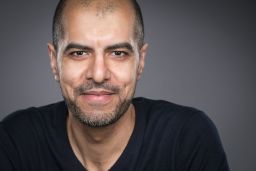Editor’s Note: Haroon Moghul is a fellow at the Institute for Social Policy and Understanding. He is an author, essayist and public speaker. Follow him @hsmoghul. The opinions expressed in this commentary are solely those of the author.
Story highlights
Planned Muslim cemetery in Texas has created controversy
Haroon Moghul: What prejudice and search engines give, familiarity takes away
The tiny town of Farmersville, Texas – population 3,300, mostly white and Christian – is terrified. Why? Because (dead) Muslims are coming!
A planned Muslim cemetery has provoked fear and anger, prompting the heartland community to stage a town hall meeting to address residents’ anxieties. Local pastor David Meeks reportedly suspects the cemetery is just a start, suggesting the Islamic Association of Collin County, which supports plans for the burial ground, may actually be planning a “mosque or madrassa training center.” Others are quoted as saying they believe the cemetery will be a “training center for militants.”

The full list of concerns is astonishing.
I don’t know what’s harder to believe: That so many people believe a cemetery could be swapped out for a militant training center without law enforcement noticing, or that radicals, regularly accused of lying about their beliefs, would believe there is no other, better cover for a jihadist camp than a Muslim cemetery?
The truth, of course, is less interesting. As it almost always is.
The greater Dallas-Fort Worth metropolitan area is home to one of America’s most vibrant Muslim communities and some of America’s most popular Muslim scholars. Indeed, the local Muslim population, estimated at 22,000, is growing. But this is not because they’re trying to take over America. Instead, Muslims are coming to Texas for the same reason other Americans are: low cost of living, nice weather and jobs. Lots and lots of jobs. Maybe some of them also like the idea of well-regarded mosques and famous imams. Regardless, their motives are very normal.
Unfortunately, it seems from recent events in Farmersville that many locals find it hard to tell Muslims apart. Are they radicals? Are they reasonable? How do we know for sure? How can we prove it?
All this could be simple bigotry, a kind of obvious Islamophobia. But it also might be just unfamiliarity. Of course, the same Americans who might confuse me for ISIS leader Abu Bakr al-Baghdadi don’t mix up their neighbors with, for example, fellow Christian Vladimir Putin. That’s because most Americans know enough Christians to be able to distinguish among them.
But when they don’t know any Muslims? Well, they might believe the worst. And that’s the real story behind Farmersville: People with little experience of diversity are suddenly confronted with it, and react out of fear or misunderstanding. In contrast, what prejudice and search engines give, familiarity takes away.
There’s no legal hurdle to the Islamic association’s cemetery, so it’s hard to see plans for the cemetery being nixed. It will become part of Farmersville life, and so will Islam, just as it has elsewhere in America.
Texas Muslims have children, and these Texans will go to school with other Texans, and future generations will think of Islam as just another faith. They’ll know that when Muslims die, they prefer to get buried. In their own cemeteries. “There isn’t a clear verbal Prophetic command, or Qur’anic verse,” Mohamed Ghilan, a Canadian scholar of Islam, explained to me, but “the Prophet Mohammed separated cemeteries by religious affiliation,” and Muslims continued to do so after him.
Years ago, I watched a heated anti-Muslim protest outside New York. Most of the attendees were clearly from out of town, and angry about the Muslims they’d never met but were sure were here to take their country. For two hours, they railed and hollered. Famished by their phobia, they made their way to the many food trucks parked on the opposite side of the street, most of which were run by Muslims, serving Sharia compliant food. It was almost too funny to be true. But the protesters didn’t know any better, the vendors were happy to turn a profit, and everybody left happy.
How can you not love this country?
